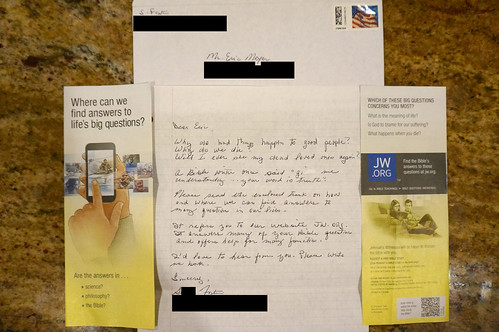Apophenia
Published 11 years, 2 months pastMy next big project is to form a rock band called The Why and release a double-length concept album titled “Apophenia”.
Kat and Carolyn were in New York City this past weekend for a brief trip, and when they got back Kat was in a bad way. I picked them up from the airport and Kat’s symptoms were such that I drove her straight to the Cleveland Clinic ER on suspicion of a cardiac event. (It wasn’t.) With the help of friends, I got the kids off to their scheduled activities and stayed with Kat. By late in the afternoon, we knew she’d be staying overnight, and we decided that I should go to be with the kids.
I gathered up the backpacks and dirty clothes from their weekend trip, slung them over my shoulder, and then stood at Kat’s bedside, holding her hand. Not speaking, just standing. Eventually she gave me a small smile and said, “Go on.”
I twitched toward the door, and failed to actually move. Kept standing. Kept holding.
“I’ll be all right, Eric. It’s fine. Go.”
“I know it’s stupid, but I’m afraid to. The two times I walked away from Rebecca in a hospital, it didn’t end well.”
We spent our last few hours of innocent ignorance in an emergency room in New Jersey, getting Rebecca rehydrated and hoping to figure out what was going on. She was so lethargic and tired, and we feared spinal meningitis. As the day wore on, she seemed stable, neither better nor worse, but one of us had to go get the other kids. We decided to have Kat stay, since she was the medical professional. I gave Rebecca a hug and kiss, told her I loved her so much and to feel better soon, and walked out the door. Not long after that, she had her first seizure.
Just a few months later, after the surgeries and protons and initial chemotherapy and our return back home to Cleveland, Rebecca finally came down with a fever. It was of course at a time that we could only take her to the ER for evaluation, to make sure she wasn’t neutropenic. It was evening, and we were hungry, so I went over to the food court while the last few tests were run before they discharged us. While I was gone, the staff gave Rebecca a routine dose of ceftriaxone, and she immediately had a strong anaphylactic reaction. We had never known she was allergic to it. Antihistamines were quickly administered, and she had to spend the night at the hospital in case the reaction flared up again. It didn’t.
Twice I walked away from a loved one lying in a hospital bed. Twice something went terribly, horribly wrong.
And of course there’s nothing to that but coincidence, but we evolved to spot patterns. It was a survival skill of the savannah, to see how disparate and apparently unconnected events tied together into a cohesive story.
Now we drag it around with us like a growth that we’ve long since ceased to notice. We see stories written in the stars and meaning imposed on our mundanity. The most common question we ask is “Why?”, and that can lead us to wonderful discoveries and insight, but it seems just as often to mislead us into an egotistic reordering of the world. Our obsessive quest for causes can all too easily cause us to invest in illusions. That pattern-recognizer that coils through the hindbrain can and does turn on us.
Think of all the conspiracy theories you’ve ever heard or believed. Think of all the times you’ve heard of something terrible happening to someone and asked yourself why it happened. Think of all the people who get blamed for what has happened to or even near them, regardless of whether we know all they did or didn’t do.
Think of all the Greek or Roman or any other culture’s myths, the stories where some person draws the notice of the gods, who then proceed to punish them for hubris or mischievously grant their prayer according to its letter but opposite its spirit. That impulse is no less strong in us. So many people ask themselves what they could have done differently to avoid their current situation, or what they’ve done to deserve what’s happened to them.
And even our language enforces this view, subtly and persistently. In the last paragraph, I could have written “So many people ask themselves what they could have done differently to avoid their fate”, but “fate” is a concept born of stories. It carries with it meanings of destiny, of supernatural forces directing a specific outcome. I even started to type the word, and then replaced it with “current situation”, which is a far more accurate rendition of what I want to say, but not nearly so poetic.
Not nearly so story-like.
We optimize our language’s patterns to favor the concepts that feel the best to us. All languages do. And in doing so, we not only reflect the patterns we see, but reinforce them. Powerfully. We reorder the way we see the world, we create patterns of filtering, and when we talk to each other we transmit those patterns to each other, self-reinforcing.
I could say the patterns are living, memetic symbiotes, and thus fall victim to the overactive pattern-recognizer in my own hindbrain.
So we ask ourselves what we could have done to save Rebecca. I can and do believe as strongly as I believe anything that there was never any hope for Rebecca. Her genetic makeup, some accident of her conception or fetal development or whatever, meant that she was always going to die of cancer as a child. We could have tried anything from megadoses of chemotherapy to experimental surgery to the latest woo-woo herbal treatments, and she still would have died. All we could affect was how long that took, and what her short life would be like as it came to an end. And we had no way to know which choices struck the best balance of lifespan and life quality.
I like to think that we did well, but for all I know some other set of choices would have given her another six or twelve months with the same quality of life she had. I don’t know, and I don’t torture myself over that; we did the best we possibly could. Perhaps that’s me imposing an absent pattern on disparate points of data again, but she did have great quality of life, up until the last week or so, and we fought ourselves to safeguard that for her. It will have to be enough.
And yet, I still ask myself sometimes if we somehow could have saved her. If there was a moment when the doctors said X, that we were supposed to do Y instead. And there’s that pattern-recognizer, affecting our language again: “we were supposed to”. As if her life was meant to be a long and perfect story, and we were too blind and stupid to see it and fulfill it. As if we failed to understand what we were supposed to do.
That same impulse is only a short step away from taking responsibility for the cancer itself. Wondering if we could have avoided the cancer entirely if we’d fed her a different diet, or lived in a different city with different air, or taken a different approach in infant medications, or to vaccination. Or if we’d been less satisfied with our lives. Maybe she’d be all right if we hadn’t had the impulse to thank whatever gods or demons might lurk beyond the horizon for our lives that seemed so right, and say no more than that; maybe she suffered for our being humbly grateful for what we had and not thinking that we needed to beg for that state to continue. Punished for the hubris of believing that our lives were good and in no need of improvement.
“What did I do to deserve this?” it’s so easy to ask. “What did she do to deserve this? Why her? Why us?”
“Why”. “Deserve”.
Patterns of instinct, encoded in language, enforced in thought, imposed on the world.
Capricious deities, lurking in the clouds. Heroes and monsters, written in the stars.
Twice I walked away from a loved one lying in a hospital bed. Twice something went terribly, horribly wrong in my absence.
So I stood there holding Kat’s hand, wanting to stay with her even if it meant sleeping in a hospital chair all night, because deep in my hindbrain, the pattern-recognizer was screaming that something would go wrong, just like those other times. That she would die if I left.
I squeezed her hand and gave her a kiss, told her I loved her and to feel better, and walked out the door.
She’s fine.

